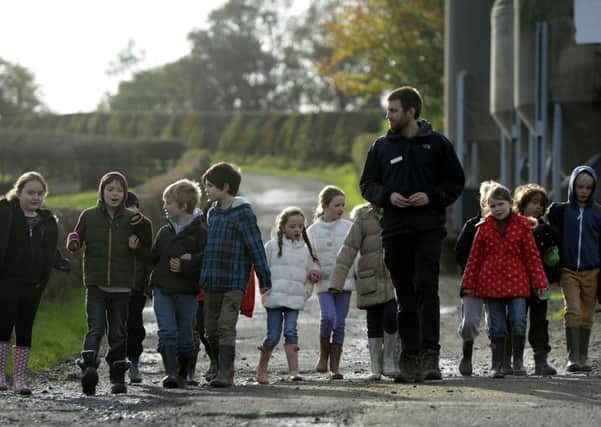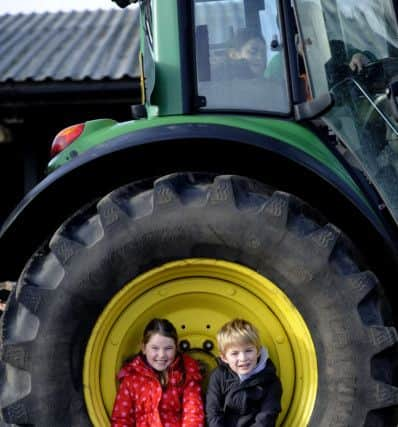Kids on farm to learn ‘cheese is not a plant’


Believe it or not, nearly a third of youngsters who took part in a recent national survey thought cheese came from plants, with a quarter believing the processed cod or haddock that makes fish fingers so irresistible actually comes from chicken or pigs.
And as more children grow up in urban, technology-driven environments that makes it unlikely they will ever even see a cow or pig, making sure they understand the origin of food is a key challenge for the city’s education and nutrition chiefs.
Advertisement
Hide AdAdvertisement
Hide AdSo what solution could be simpler than taking the consumers of the future to a local farm to find out where the juicy beef burger they’ve been looking forward to all week really comes from?


That is exactly what experts at the Royal Highland Education Trust (RHET) have been doing with thousands of youngsters aged three to 18 as part of a drive to reconnect nursery children and school pupils across the Lothians with farming, agriculture and food production.
And the campaign to make sure young people are better educated about what they eat is set to step up a gear as the first annual RHET Week – which will bring interactive farm and classroom-based sessions to children the length and breadth of Scotland – prepares to kick off next Friday.
Down at Oatridge Farm in West Lothian, a visit by a group of eager P4s from Low Port Primary in Linlithgow proves there are still exceptions to the rule of young people who are clueless about food.
Guided by farmers and agricultural students from neighbouring Oatridge College, now known as SRUC Oatridge Campus, the youngsters are able to get up close and personal with sheep, cattle and the odd wandering chicken.
And though several pupils – many of whom live on or close to farms – are no strangers to the agricultural set up with its pungent aromas, combine harvesters and other unusual machinery, they still find the trip an eye-opener.
Oatridge HNC student Ross Palmer, 18, who spends four days a week on the farm as part of his studies, says: “There’s a mixture of abilities on what they know.
“Some of them have no idea.
“They assume their food comes from the supermarket – or out of a packet.
Advertisement
Hide AdAdvertisement
Hide Ad“They ask why we have cows and what we use them for – and some don’t like the burger bit.
“We don’t say it directly, but we’ll gauge it for whatever age they are.
“They might even ask if we would ever ride a cow – they don’t necessarily see it as a food item. They don’t see the farm as a business like that.
“But some are very understanding.
“They are maybe quite surprised at the start – but once they see what’s happening, they’re OK.”
He adds: “A visit like this just shows them how things work, what we do, how we feed the animals – the management of the farm and so on.
“It’s good they know where their food is from and what people on farms do – how hard it actually is.”
Of course children will always think of the question no-one is expecting.
Beaming Oscar Garcia, eight, says: “I asked if you could jump into the barley and have a giant mouthful of it to try it! We learned about lots of different food and how they’re made – and about how much work you have to do to make good food.”
Advertisement
Hide AdAdvertisement
Hide AdClassmate Emma Crawford, eight, adds: “I really enjoyed it at the farm.
“Seeing the silage makers was the most surprising thing – because I didn’t really know what it was.
“I just thought it was lots and lots of grass.”
Even Megan Vanderwethizen, eight, who is a bit of an expert as she lives near a farm, found the visit interesting.
“I’m glad I came to the farm today,” she says.
“The sheep have a coloured dot on the back to tell if they’re pregnant or not. It’s important we came because most of our food comes from the farm. It’s important we know where it comes from so we don’t throw it away.”
For Lois Kynoch, eight, the visit to Oatridge provided an opportunity to learn not only about what is put on her dinner plate and where it comes from but also how animals are cared for and treated before the final journey to the slaughterhouse.
“We learned about all the animals on the farm and what they eat,” she says.
“I thought a lot of my food came from Africa or a different country – different places in the world.”
For RHET leaders, this year’s classes and farm visits mark a period of accelerating growth for the trust as it seeks to take its message to schools and nurseries across Edinburgh, the Lothians and Scotland – all with the aim of inspiring the youngsters to become the nation’s farmers of the future.
Advertisement
Hide AdAdvertisement
Hide AdAnd as well as trips and hands-on sessions with tractors, holding pens and silage makers, the week-long event will feature interactive food and farming workshops, and one-off debates.
The effort is being aided by hundreds of volunteers – from farmers and teachers to students and retired members of the agricultural community – who last year helped RHET reach more than 700 schools across Scotland. And in addition to helping reverse the trend among young people towards total detachment from the origin and history of food, RHET’s outreach work – which last year provided farm visits for 1230 Lothians-based youngsters and classroom talks for a further 2443 – is set to transform pupils’ sense of the value of food.
For Trust staff, the hands-on experience offered during farm sessions will be key to the project’s long-term success.
Karen Valentine, RHET Lothians coordinator, says: “There’s so much more to learning about where our food comes from than just writing or painting a picture or watching a video.
“You cannot comprehend how big a cow is until you have come to the farm and gone face to face with it.
“When you come to the farm, you realise how much care farmers take – what goes into looking after the animals.
“The people who speak to the children don’t shy away from the fact that they want to fatten up the animals so they get a good price, and that’s what you would buy in the shops.”
She said discoveries made while youngsters are on the farm should help generate a far deeper understanding of why some cuts of meat are more expensive than others.
Advertisement
Hide AdAdvertisement
Hide Ad“I think the pupils were just really excited to be here,” she said.
“You would also hope that they might in future, when they go into the shops themselves, think a bit more about what they would choose to buy – about why one piece of meat is a bit more expensive and about the care that’s gone into it.
“And about the fact that animal will have been fed outdoors, in less intensive conditions, and won’t automatically go for the cheapest all the time.”
For Nicola Crombie, P4 class teacher at Low Port Primary, the session at Oatridge Farm will be of value for her pupils simply because it means bringing food education out of books and into the real world.
“The visit has brought the issue of food to life for the children,” she said.
“I think they’ve really enjoyed the opportunity to see the things that we have talked about in class. And I think it gives them a better respect for their food and the process it goes through before it’s brought to them.
“The visit has brought the whole thing alive – the feel of the sheep’s fleece, the sounds and the smells of the farm. They see all the work that’s involved in caring for animals.
“It means they know something of the reality of where food comes from.”
nRHET Week takes place between November 15 and 24. For more information, visit www.rhet.org.uk.